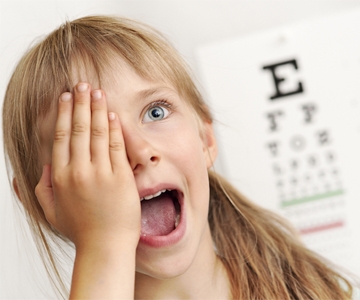
Description
Good eyesight is crucial in making sure a child develops to their full potential both at school and socially. Anyone can develop sight problems – but it is especially important to look after children’s eyes. The eye is still developing throughout early childhood so if problems are treated early, it can make a lasting difference.
How do I know if my child has an eye problem? Some eye conditions do not display any signs or symptoms, so the only way to know for sure is to take your child for a sight test.
Signs which may show there is a problem with a child’s sight include:
• an eye appearing to drift inwards or outwards;
• difficulty concentrating;
• behavioural problems;
• headaches;
• sitting too close to the television; or
• rubbing their eyes a lot.
The condition ‘lazy eye’ can run in the family, so if someone in your family has either an eye turn (‘squint’) or suffers from reduced vision in one or both eyes (‘amblyopia’), it’s a good idea to take any related children for a sight test.
What is vision screening? Some children have their vision screened at school – this is usually a basic test, designed to pick up children who have reduced vision in one or both eyes. If a problem is suspected, children will usually be referred to an optometrist for a full sight test. Parents may assume that their child has been screened at school but this does not happen in all areas of the country. Even where this does happen, it is not usually until the age of four or five, so we recommend that all children visit their optometrist for a sight test around the age of three.
What is a sight test? A sight test is a comprehensive check which can pick up many conditions, including colour vision defects, problems with the development of 3D vision and any need for glasses. Taking children for sight tests from an early age helps to build good eye health habits into adulthood. Optometrists can use a range of tests for young children, including pictures and even tests that do not need your child to give an actual response.
When should my child visit the optometrist? Although the UK National Screening Committee recommends screening at age four to five years, there are many optometrists who will see children much younger than this for a sight test. We recommend that children have a sight test around the age of three, so that conditions are picked up and treated early. After the first test it is a good idea to return every two years, or as recommended by your optometrist.
All children are entitled to NHS-funded sight tests and help with the cost of glasses Children under the age of 16 are entitled to NHS-funded sight tests and an optical voucher. An optical voucher entitles you to help towards the cost of glasses or contact lenses if they are needed.
What can I do if I don’t want my child to wear glasses? Some parents avoid taking their children for a sight test, because they do not want them to wear glasses. You may remember being teased for wearing ‘NHS issue’ glasses during your own childhood and be reluctant for your children to go through the same experience. It’s important to understand that some children do need visual correction so their vision can develop normally and to achieve their full potential. The good news is there is now a much wider range of attractive frames to choose from and less stigma attached to wearing glasses. These days, optometrists often find children are disappointed when told that they don’t need to wear glasses! Many children are also suitable for contact lenses. This is particularly helpful for children who take part in regular sports activities and they can be successfully worn from an earlier age than most parents expect. Ask your optometrist whether contact lenses would be suitable for your child.
What else can I do to look after my child’s eyes?
• Get them outdoors – regular play and exercise can help with eye health. Studies show two hours of outdoor activity a day is ideal for healthy eyes (information from Effect of time spent outdoors at school on the development of myopia among children in China – A randomized clinical trial).
• Make sure they eat healthily and drink enough fluids. • Protect their eyes from the sun – never let them look directly into the sun and make sure they always wear good quality sunglasses (the glasses should always carry the ‘CE’ quality mark and the British Standard BS EN 1836:2005).

